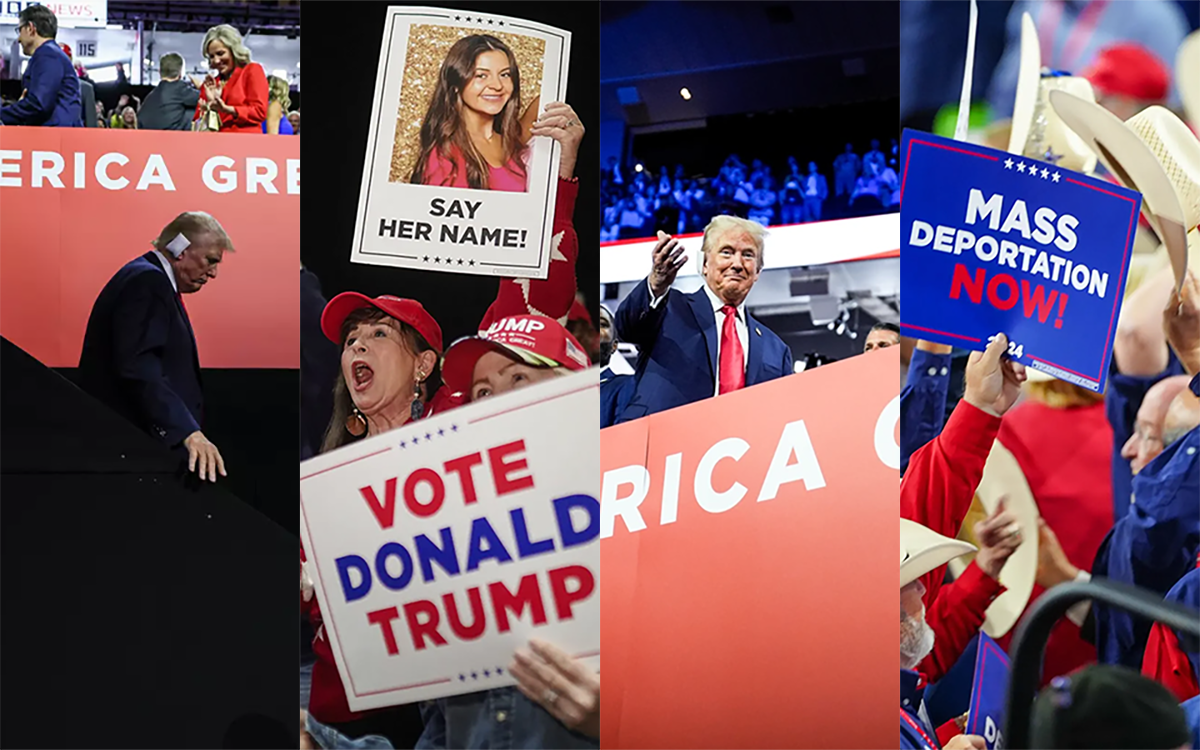The Republican National Convention (RNC) has once again placed immigration at the forefront of its agenda, with a distinct focus on portraying white women as victims of crimes allegedly committed by undocumented immigrants. Thankfully, Latina journalists are providing critical insight into the RNC, poking holes in their racist arguments. Check out (and share!) their work:
White Women as Central Figures in Anti-Immigrant Messaging
Barbara Rodriguez of The 19th News highlights how the RNC’s narrative portrays white women as victims, constructing a connection between immigration and crime. Rodriguez points out that this strategy is not new, drawing on a long history of emphasizing white women’s fragility when it comes to interacting with men of color. This approach is particularly potent in its emotional appeal to the Republican base, despite research indicating that immigration is associated with lower crime rates. The RNC cherry-picks these stories to stoke fear and justify stringent immigration policies.
Trump’s Unchanging and Escalating Rhetoric
Suzanne Gamboa of NBC News provides a thorough examination of former President Trump’s persistent and escalating anti-immigrant rhetoric. Trump has not only maintained his previous stance but has intensified his language, claiming that immigrants are “poisoning the blood” of the country and accusing other nations of offloading their prisoners and mentally ill onto the US. Gamboa underscores Trump’s pledge to execute the largest mass deportation in American history if re-elected, invoking the controversial and racially charged “Operation Wetback” from the Eisenhower era. This rhetoric serves to galvanize his base while promoting an exclusionary vision of America.
Invoking the Names of Victims
Jazmine Ulloa of The New York Times identifies a pattern in the RNC’s messaging: the invocation of names like Kate Steinle, Laken Riley, and Rachel Morin – white women whose deaths have been linked to undocumented immigrants. Ulloa explains how the RNC strategically uses these names to advocate for mass deportations and draconian immigration policies. Their repetition of these stories in their political discourse seeks to create a direct link in the public’s mind between undocumented immigrants and violent crime, reinforcing a narrative of fear and urgency.
The ‘Us Versus Them’ Rhetoric
Andrea Castillo of the LA Times explores the broader implications of the RNC’s messaging, particularly in the context of law and order. Castillo quotes Sonja Diaz, who argues that the aftermath of the attempted assassination of Trump could invigorate exclusionary law enforcement policies that disproportionately affect immigrants. Diaz emphasizes the “us versus them” mentality that is firmly rooted at the US-Mexico border, illustrating how this narrative exacerbates divisions and fosters an environment of exclusion.
Far-Right Attacks on Mixed-Race Families
Mariana Alfaro of The Washington Post highlights the far-right’s vitriolic attacks on J.D. Vance’s wife, Usha, due to her Indian heritage. These attacks, which target the Vance family’s mixed-race background, underscore the pervasive racism within certain factions of the Republican base. Alfaro’s reporting illustrates how these extremist views not only undermine the fabric of multicultural families but also perpetuate a hostile atmosphere for immigrants and minorities.

These Latina journalists’s RNC coverage reveals the deeply entrenched and strategic use of anti-immigrant rhetoric by the GOP. By focusing on white women as victims, amplifying fears of crime, and promoting exclusionary policies, the RNC aims to galvanize its base through a narrative of fear and division. The critical perspectives provided by Rodriguez, Gamboa, Ulloa, Castillo, and Alfaro offer a nuanced understanding of these tactics and their broader implications for Latino communities and the United States at large. We need journalists like them to underscore the importance of diverse voices in news, who can challenge and contextualize the political narratives shaping public discourse.

